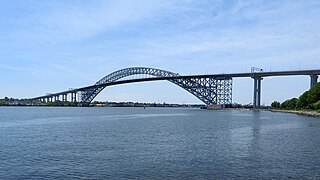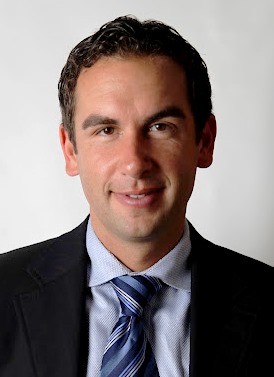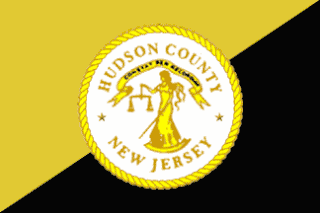Related Research Articles

Bayonne is a city in Hudson County in the U.S. state of New Jersey. Located in the Gateway Region, Bayonne is situated on a peninsula between Newark Bay to the west, the Kill Van Kull to the south, and New York Bay to the east. As of the 2020 United States census, the city was the state's 15th-most-populous municipality, surpassing 2010 #15 Passaic, with a population of 71,686, an increase of 8,662 (+13.7%) from the 2010 census count of 63,024, which in turn reflected an increase of 1,182 (+1.9%) from the 61,842 counted in the 2000 census. The Census Bureau's Population Estimates Program calculated that the city's population was 69,527 in 2022, ranking the city the 543rd-most-populous in the country.

Mount Olive Township is a township in Morris County, in the U.S. state of New Jersey. As of the 2020 United States census, the township's population was 28,886, its highest decennial census count ever and an increase of 769 (+2.7%) from the 2010 census count of 28,117, which in turn reflected an increase of 3,924 (+16.2%) from the 24,193 counted in the 2000 census. Located within the Raritan Valley region, Mount Olive is situated in western Morris County bordering both Sussex and Warren counties along the Musconetcong River.
The Walsh Act is a legislation in the U.S. state of New Jersey that permits municipalities to adopt a non-partisan commission form of government. The legislation was signed by Governor of New Jersey Woodrow Wilson on April 25, 1911. The commissions in Walsh Act municipalities are composed of either three or five members elected for four-year concurrent terms. The commissioners also serve as department heads in addition to their legislative functions. The commissioners elect one commissioner as mayor, who serves as chair of the commission. With few exceptions, Walsh Act mayors have no powers over and above their fellow commissioners, and are only responsible for their specific department(s).

The Mayor of the City of Hoboken is the head of the executive branch of government of Hoboken, New Jersey, United States. The mayor has the duty to enforce the municipal charter and ordinances; prepare the annual budget; appoint deputy mayors, department heads, and aides; and approve or veto ordinances passed by the City Council. The mayor is popularly elected in a nonpartisan general election. The office is held for a four-year term without term limits.
A village, in the context of New Jersey local government, is one of five types and one of eleven forms of municipal government.
The Optional Municipal Charter Law or Faulkner Act provides New Jersey municipalities with a variety of models of local government. This legislation is called the Faulkner Act in honor of the late Bayard H. Faulkner, former mayor of Montclair, New Jersey and chairman of the Commission on Municipal Government.

The Mayor of the City of Jersey City is the head of the executive branch of the government of Jersey City, New Jersey, United States. The mayor has the duty to enforce the municipal charter and ordinances; prepare the annual budget; appoint deputy mayors, department heads, and aides; and approve or veto ordinances passed by the City Council. The mayor is popularly elected in a nonpartisan general election. The office is held for a four-year term without term limits, although the current term is a four-and-a-half-year term, due to a change in election dates.
Bayard Hilton Faulkner was Mayor of Montclair, New Jersey, and chairman of the 1950 Commission on Municipal Government. The legislation crafted by this commission to update and reform New Jersey's municipal law is commonly called the Faulkner Act, named in his honor.
A special charter allows a New Jersey municipality to operate under a charter that differs from those of the traditional forms of government or the many options available under the Faulkner Act. Under the terms of the New Jersey State Constitution of 1947 and the Faulkner Act of 1950, a municipality may obtain a special charter form from the New Jersey Legislature, providing a unique form of governmental organization for that community.

Atlantic City, New Jersey was incorporated on May 1, 1854. It is governed within the Faulkner Act under the Mayor-Council system of municipal government, implemented by direct petition effective as of July 1, 1982. The City Council is the governing body of Atlantic City. There are nine Council members, who are elected to serve for a term of four years, one from each of six wards and three serving at-large. The City Council exercises the legislative power of the municipality for the purpose of holding Council meetings to introduce ordinances and resolutions to regulate City government. In addition, Council members review budgets submitted by the Mayor; provide for an annual audit of the city's accounts and financial transactions; organize standing committees and hold public hearings to address important issues which impact Atlantic City. Former Mayor Bob Levy created the Atlantic City Ethics Board in 2007, but the Board was dissolved two years later by vote of the Atlantic City Council. Since its incorporation in 1854, the town has had 41 mayors.
The state of Michigan is largely divided in the same way as many other U.S. states, but is distinct in its usage of charter townships. Michigan ranks 13th among the fifty states in terms of the number of local governmental entities.
Local government in New Jersey is composed of counties and municipalities. Local jurisdictions in New Jersey differ from those in some other states because every square foot of the state is part of exactly one municipality; each of the 564 municipalities is in exactly one county; and each of the 21 counties has more than one municipality. New Jersey has no independent cities, or consolidated city-counties.
The Municipal Council is the legislative branch of government for Newark, New Jersey.
Burlington, New Jersey was incorporated on December 21, 1784. It is governed within the Faulkner Act under the Mayor-Council form of municipal government, implemented based on the recommendations of a Charter Study Commission as of January 1, 1992. The governing body consists of a mayor and a seven-member Common Council, all elected on a partisan basis in a vote held as part of the November general election. The Mayor serves a four-year term of office. The Common Council consists of seven members, each serving four-year terms of office: three at-large Councilpersons representing the entire City and one representing each of the four voting wards, with the at||large and mayoral seats up for election as a group and the ward seats up for vote two years later. The term for mayor runs from January 1 to December 31.
Orange, New Jersey is governed within the Faulkner Act, formally known as the Optional Municipal Charter Law, under the Mayor-Council form of municipal government, with a directly elected mayor and a City Council consisting of four ward representatives and three at-large representatives. Councilmembers are elected to serve four-year terms of office in non-partisan elections on a staggered basis with the four ward seats and the three at-large seats coming up for election on an alternating cycle every two years.
The Mayor of Long Branch, New Jersey is the chief executive officer of the city of Long Branch, New Jersey.
Wildwood, New Jersey was incorporated on May 1, 1895 as a borough. and was reincorporated on January 1, 1912 as a city and merged with Holly Beach, New Jersey. It is governed by a three-member commission under the Walsh Act Commission form of municipal government. All three commissioners are elected at-large on a nonpartisan basis to serve concurrent four-year terms of office, with the vote taking place as part of the November general election. At a reorganization conducted after each election, the commission selects one of its members to serve as mayor and gives each commissioner an assigned department to oversee and operate. The mayors were:

The County Executive of Hudson County, New Jersey, United States is the chief officer of the county's executive branch who oversees the administration of county government and works in collaboration with the nine-member Board of County Commissioners, which acts in a legislative role. The New Jersey Superior Court had subsumed and replaced county courts in 1983. The office of the county executive is in the Hudson County Courthouse in the county seat, Jersey City.
References
- ↑ "The Faulkner Act: New Jersey's Optional Municipal Charter Law" Archived October 12, 2013, at the Wayback Machine , New Jersey State League of Municipalities, July 2007. Accessed October 29, 2013.
- ↑ 2012 New Jersey Legislative District Data Book, Rutgers University Edward J. Bloustein School of Planning and Public Policy, March 2013, p. 135.
- ↑ Broadway National Bank of Bayonne v. Parking Authority, New Jersey Superior Court, Law Division decided August 2, 1962. Via FindACase.com. Accessed November 27, 2011. "The facts are undisputed. The City of Bayonne was governed by a board of commissioners in accordance with the Walsh Act until July 1, 1962.... Mayor-Council Plan C of the Faulkner Act (NJSA 40:69A-1 et seq.) was adopted by referendum in the City of Bayonne and took effect on July 1, 1962."
- ↑ "Mayors of Bayonne, New Jersey". Political Graveyard . Retrieved 2018-01-19.
- ↑ "Mayors of Bayonne, New Jersey". Bayonne Public Library . Retrieved 2018-01-19.
- ↑ "FORMER MAYOR CAIN OF BAYONNE IS DEAD; Elected for a Two-Year Term in 1909--Ex-Manager of the Babcock & Wilcox Plant". The New York Times. 18 January 1937.
- ↑ "Dr. Axford Quits Bayonne Post". New York Times . October 19, 1930.
- ↑ "Dr. W. H. Axford, Bayonne Ex-Mayor. X-Ray Specialist Named Three Times to City Commission". New York Times . September 18, 1942.
- ↑ "CONTENTdm".
- ↑ "Bayonne to hold ceremony commemorating new bell and clock tower". 23 November 2022.
- ↑ Sullivan, Al (June 16, 2006). "For the birds? Rutkowski Park designed to show off wildlife". Hudson Reporter.
- ↑ "Mayor Jimmy Davis". Bayonne, New Jersey . Retrieved 2018-01-19.